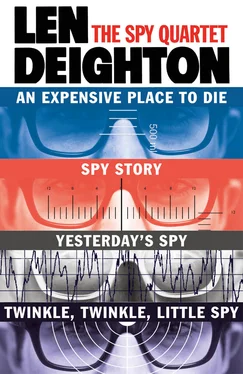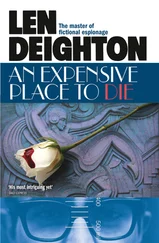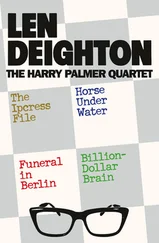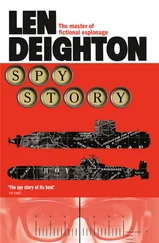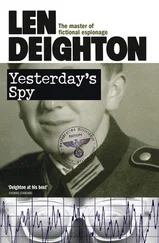We threw the dice and the little wooden discs went trotting around the board, paying their rents and going to prison and taking their chances just like humans. ‘A voyage of destruction,’ Madame Tastevin said it was.
‘That’s what all life is,’ said M. Datt. ‘We start to die on the day we are born.’
My chance card said ‘ Faites des réparations dans toutes vos maisons ’ and I had to pay 2,500 francs on each of my houses. It almost knocked me out of the game but I scraped by. As I finished settling up I saw the courier cross the terrasse. It was the same man who had come last time. He took it very slow and stayed close to the wall. A coffee crème and a slow appraisal of the customers before contacting me. Professional. Sift the tails off and duck from trouble. He saw me but gave no sign of doing so.
‘More coffee for all of us,’ said Madame Tastevin. She watched the two waiters laying the tables for lunch, and now she called out to them, ‘That glass is smeary’, ‘Use the pink napkins, save the white ones for evening’, ‘Be sure there is enough terrine today. I’ll be angry if we run short.’ The waiters were keen that Madame shouldn’t get angry, they moved anxiously, patting the cloths and making microscopic adjustments to the placing of the cutlery. The taxi-drivers decided upon another game and there was a rattle of wooden balls as the coin went into the slot.
The courier had brought out a copy of L’Express and was reading it and sipping abstractedly at his coffee. Perhaps he’ll go away, I thought, perhaps I won’t have to listen to his endless official instructions. Madame Tastevin was in dire straits, she mortgaged three of her properties. On the cover of L’Express there was a picture of the American Ambassador to France shaking hands with a film star at a festival.
M. Datt said, ‘Can I smell a terrine cooking? What a good smell.’
Madame nodded and smiled. ‘When I was a girl all Paris was alive with smells; oil paint and horse sweat, dung and leaky gas lamps and everywhere the smell of superb French cooking. Ah!’ She threw the dice and moved. ‘Now,’ she said, ‘it smells of diesel, synthetic garlic, hamburgers and money.’
M. Datt said, ‘Your dice.’
‘Okay,’ I told him. ‘But I must go upstairs in a moment. I have so much work to do.’ I said it loud enough to encourage the courier to order a second coffee.
Landing on the Boul des Capucines destroyed Madame Tastevin.
‘I’m a scientist,’ said M. Datt, picking up the pieces of Madame Tastevin’s bankruptcy. ‘The scientific method is inevitable and true.’
‘True to what?’ I asked. ‘True to scientists, true to history, true to fate, true to what?’
‘True to itself,’ said Datt.
‘The most evasive truth of all,’ I said.
M. Datt turned to me, studied my face and wet his lips before beginning to talk. ‘We have begun in a bad … a silly way.’ Jean-Paul came into the café – he had been having lunch there every day lately. He waved airily to us and bought cigarettes at the counter.
‘But there are certain things that I don’t understand,’ Datt continued. ‘What are you doing carrying a case-load of atomic secrets?’
‘And what are you doing stealing it?’
Jean-Paul came across to the table, looked at both of us and sat down.
‘Retrieving,’ said Datt. ‘I retrieved it for you.’
‘Then let’s ask Jean-Paul to remove his gloves,’ I said.
Jean-Paul watched M. Datt anxiously. ‘He knows,’ said M. Datt. ‘Admit it, Jean-Paul.’
‘On account,’ I explained to Jean-Paul, ‘of how we began in a bad and silly way.’
‘I said that,’ said M. Datt to Jean-Paul. ‘I said we had started in a bad and silly way and now we want to handle things differently.’
I leaned across and peeled back the wrist of Jean-Paul’s cotton gloves. The flesh was stained violet with ‘nin’. 7
‘Such an embarrassment for the boy,’ said M. Datt, smiling. Jean-Paul glowered at him.
‘Do you want to buy the documents?’ I asked.
M. Datt shrugged. ‘Perhaps. I will give you ten thousand new francs, but if you want more than that I would not be interested.’
‘I’ll need double that,’ I said.
‘And if I decline?’
‘You won’t get every second sheet, which I removed and deposited elsewhere.’
‘You are no fool,’ said M. Datt. ‘To tell you the truth the documents were so easy to get from you that I suspected their authenticity. I’m glad to find you are no fool.’
‘There are more documents,’ I said. ‘A higher percentage will be Xerox copies but you probably won’t mind that. The first batch had a high proportion of originals to persuade you of their
authenticity, but it’s too risky to do that regularly.’
‘Whom do you work for?’
‘Never mind who I work for. Do you want them or not?’
M. Datt nodded, smiled grimly and said, ‘Agreed, my friend. Agreed.’ He waved an arm and called for coffee. ‘It’s just curiosity. Not that your documents are anything like my scientific interests. I shall use them merely to stimulate my mind. Then they will be destroyed. You can have them back …’ The courier finished his coffee and then went upstairs, trying to look as though he was going no farther than the toilets on the first floor.
I blew my nose noisily and then lit a cigarette. ‘I don’t care what you do with them, monsieur. My fingerprints are not on the documents and there is no way to connect them with me; do as you wish with them. I don’t know if these documents connect with your work. I don’t even know what your work is.’
‘My present work is scientific,’ explained Datt. ‘I run my clinic to investigate the patterns of human behaviour. I could make much more money elsewhere, my qualifications are good. I am an analyst. I am still a good doctor. I could lecture on several different subjects: upon oriental art, Buddhism or even Marxist theory. I am considered an authority on Existentialism and especially upon Existentialist psychology; but the work I am doing now is the work by which I will be known. The idea of being remembered after death becomes important as one gets old.’ He threw the dice and moved past Départ. ‘Give me my twenty thousand francs,’ he said.
‘What do you do at this clinic?’ I peeled off the toy money and passed it to him. He counted it and stacked it up.
‘People are blinded by the sexual nature of my work. They fail to see it in its true light. They think only of the sex activity.’ He sighed. ‘It’s natural, I suppose. My work is important merely because people cannot consider the subject objectively. I can; so I am one of the few men who can control such a project.’
‘You analyse the sexual activity?’
‘Yes,’ said Datt. ‘No one does anything they do not wish to do. We do employ girls but most of the people who go to the house go there as couples, and they leave in couples. I’ll buy two more houses.’
‘The same couples?’
‘Not always,’ said Datt. ‘But that is not necessarily a thing to be deplored. People are mentally in bondage, and their sexual activity is the cipher which can help to explain their problems. You’re not collecting your rent.’ He pushed it over to me.
‘You are sure that you are not rationalizing the ownership of a whorehouse?’
‘Come along there now and see,’ said Datt. ‘It is only a matter of time before you land upon my hotels in the Avenue de la République.’ He shuffled his property cards together. ‘And then you are no more.’
‘You mean the clinic is operating at noon?’
‘The human animal,’ said Datt, ‘is unique in that its sexual cycle continues unabated from puberty to death.’ He folded up the Monopoly board.
Читать дальше
